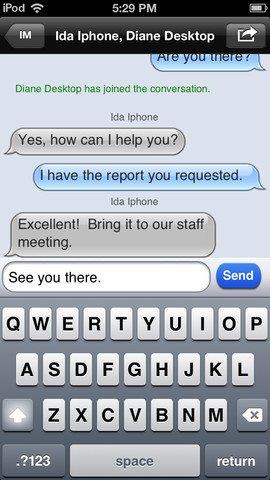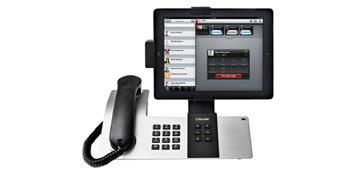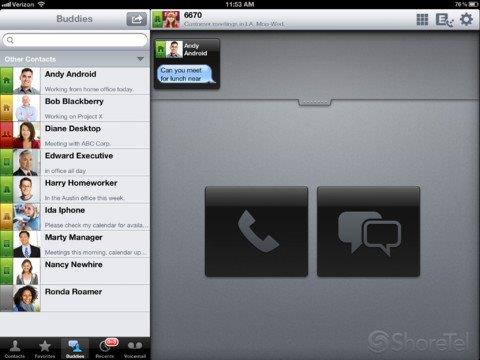 In addition to the premise-based, all-in-one IP phone system with unified communications and contact center capabilities, ShoreTel offers cloud-based communications.
In addition to the premise-based, all-in-one IP phone system with unified communications and contact center capabilities, ShoreTel offers cloud-based communications.
ShoreTel Sky delivers businesses of all sizes proven and secure hosted VOIP, hosted unified communications (UC) and hosted contact center services. Its solutions are built to scale, grow, and evolve as needed, so companies can buy, or subscribe to, the business communication solution they need today, with no risk to their original investment should their needs change tomorrow.
 Indeed, ShoreTel's Unified Communication solution is based on a distributed architecture with a single image for administration. While traditional time-division multiplexing (TDM) systems or competitor VoIP solutions require 2N redundancy, ShoreTel accomplishes redundancy at N+1 by balancing the load on Linux based solid state voice appliances. Their appliances use embedded flash memory and do not have any spinning media or hard drive. Thus, to no surprise, ShoreTel has 22,000 customer and over 2 million users of ShoreTel's communications software around the world.
Indeed, ShoreTel's Unified Communication solution is based on a distributed architecture with a single image for administration. While traditional time-division multiplexing (TDM) systems or competitor VoIP solutions require 2N redundancy, ShoreTel accomplishes redundancy at N+1 by balancing the load on Linux based solid state voice appliances. Their appliances use embedded flash memory and do not have any spinning media or hard drive. Thus, to no surprise, ShoreTel has 22,000 customer and over 2 million users of ShoreTel's communications software around the world.
Bruce Downing, Managing Director for Asia and South Africa, whom Asian eMarketing met for an interview recently, explains that what sets Shoretel apart from the competition is that their„ solutions are developed with the end user in mind”, adding: “We don‘t have a lot of legacy solutions and products like our competitors, we‘ve kind of gone the other way around, what is the end user looking for, and developed it back in.”
He further elaborated that ShoreTel got into the cloud business with their acquisition of M5 Networks around a year ago, a leading provider of cloud based "UC as a Service" solutions company, to extend services to include both premise and hosted communications solutions. According to Downing, it has gone exceptionally well for them and continues to grow.
 The M5 services are now branded as ShoreTel Sky and operate within the cloud division of ShoreTel. Since the acquisition, new services have been introduced, including integrated instant messaging and conferencing. ShoreTel Mobility, smartphone software and SIP server based solutions are now available to both premise and cloud customers.
The M5 services are now branded as ShoreTel Sky and operate within the cloud division of ShoreTel. Since the acquisition, new services have been introduced, including integrated instant messaging and conferencing. ShoreTel Mobility, smartphone software and SIP server based solutions are now available to both premise and cloud customers.
According to Bruce, most big multinational companies are only now planning or starting to implement their UC plans.However, a global study last year by Fortinet, a leader in high-performance network security, reveals that more than 85 per cent of Asian respondents already engage in the practice of BYOD, higher than the global figure of 74 per cent.
The BYOD frontrunners globally are South Korea at 93%, Singapore at 90%, followed by China and Taiwan at 88% each.
Furthermore, 47% of Asians are less likely to comply with corporate BYOD policies, banning the use of personally owned devices for work purposes, compared to the global figure of 42%.
As a result, an Ovum study last year found that more than 70% of multinational corporations (MNCs) in Asia are implementing policies to support approved employee-owned mobile devices.
Particularly in Singapore, BYOD is a norm, not a new trend.
Charles Reed Anderson, Head of Telecom Research and Mobility, IDC Asia-Pacific, said Singapore’s companies will leverage it more than other countries and there is a notable shift from iPhones and iPads being viewed as consumer devices to enterprise essentials.”
“I think one of the reasons that this has happened is that the underlying infrastructure in these countries is there“, Bruce said, adding: “We‘re in for some really interesting times in the next few years. Asia, as an overall market’ is a very interesting place, and you do have some real leaders out there. Ultimately we‘d like to have an online store where the user can download applications from the corporate side as well.“
In conjunction with the launch of ShoreTel‘s new business-grade device that transforms iPhones and iPads into desk phones for mobile generation, Bruce explained how this game-changing solution fuses the convenience of mobile devices with the power of a business communications system.
"People want mobility and they want to be able to communicate. They all have smart devices and expect to be connected to the corporate as well. So we developed our mobility solution, which is a secure software client which sits on almost all smart devices, allowing you to connect to your corporate system. It really does extend the IPBX functionality that we all are used to when we sit down at our desks to mobile devices, irrespective to where you are - provided that you have access to Wi-Fi or 3G or 4G."
 “For example, if you‘re sitting at the airport somewhere and someone phones your desk phone, you can pick up this call, and if you are on that call in a Wi-Fi zone and you walk out and start using the mobile service, it will switch over to 3G, and if you walk into the office from there it would switch back”, he explains.
“For example, if you‘re sitting at the airport somewhere and someone phones your desk phone, you can pick up this call, and if you are on that call in a Wi-Fi zone and you walk out and start using the mobile service, it will switch over to 3G, and if you walk into the office from there it would switch back”, he explains.
“There‘s a tremendous value from a cost-saving perspective, especially for the multinational companies, with offices around the world. They are saving significantly on their mobile bills. Besides, from a productivity perspective, users can just dial 4 digits wherever they are in the world. You also have access to your corporate directory“, he added.
Bruce went on to speak about bringing mobility and roaming into the corporate life, clarifying that „up until now there has been a segmentation of either premise based or mobility based solutions”.
“We just brought our docking station to market, where you can walk into your office and plug in your mobile device, and continue your call via the handset or speaker. It not only integrates your business communications, it also gives you the option of using your smart device at your desk, giving you the feel of the traditional IPBX device. And, even if you‘re in another country, you can make local calls via land line from your corporate network. At the moment, we are only supporting Apple devices. We‘ve been working on this for two years now and we need to adapt the interfaces for Android and other operating systems, too“.
The ShoreTel Dock, when combined with the ShoreTel Mobility Client extends Unified Communications applications including voice, location-aware presence and instant messaging to mobile devices securely, enabling users to utilize their smart device as the primary communications device. This industry-first hardware solution will optimize how people use their iPhones and iPads for work – giving a new meaning to BYOD and making it reality.
When asked about his expectations for the Asia Pacific market, Bruce answered that ShoreTel‘s „solutions have been sold across all verticals and scale across all verticals, and now we‘re starting to focus on some key verticals e.g. the governments, the finance sector and multinationals. We‘re really in for a shift in the way unified communications happens, with companies needing to make investments for change, and truly merging mobility on a smart device with an enterprise network, while raising productivity and saving costs.“
By Mohamad El Hallak


